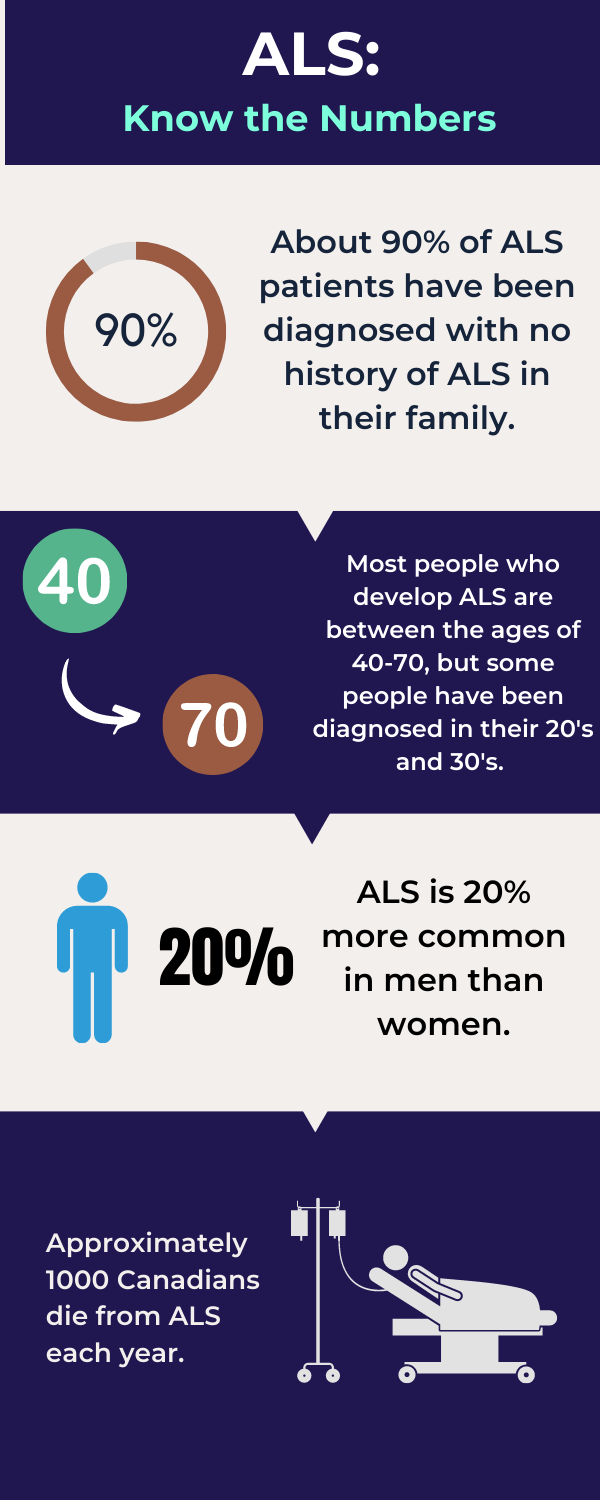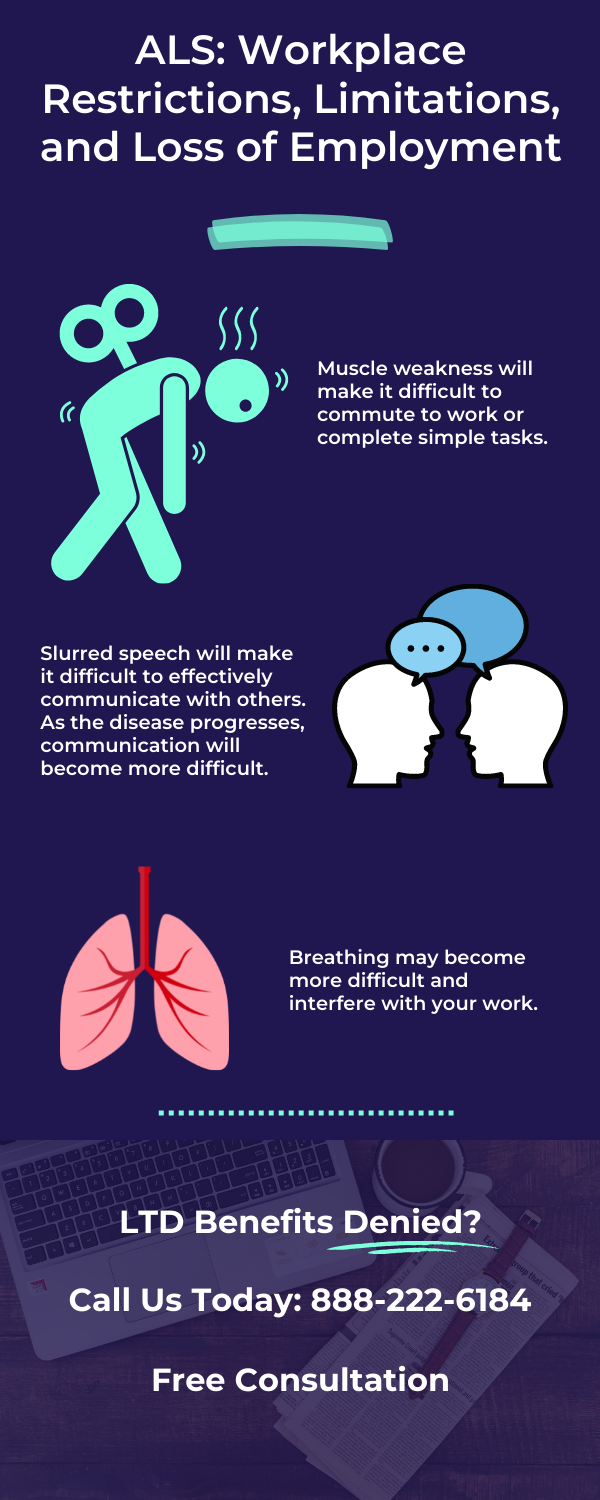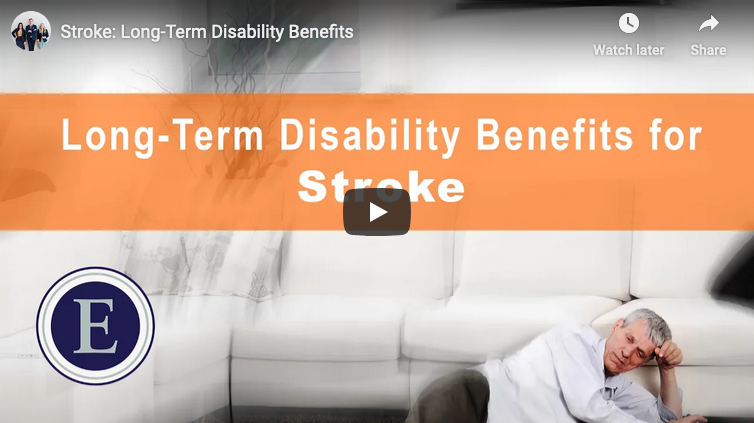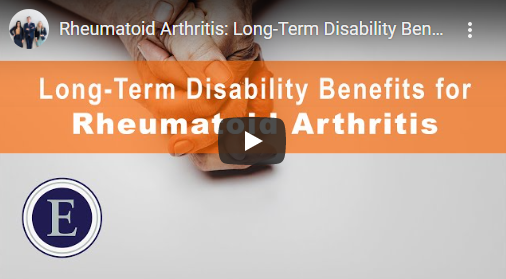Do I Qualify for Long-Term Disability Benefits if I Have ALS?
Can I Get Long-Term Disability Benefits for ALS?
One of the most common questions we get is “Do I qualify for long-term disability benefits if I have ALS?”
Amyotrophic Lateral Sclerosis (ALS) is a progressive disease of the brain and spinal cord that causes a loss of muscle control. Muscle weakness, difficulty walking, and speech impairment, the symptoms of ALS, can have a significant impact on a person’s employment and daily life.
Therefore, ALS can qualify for long-term disability benefits – provided it is not excluded by your insurance policy wording.
LTD Denied? Which Category Do You Fit In?
Category 1: The insurance company denied your initial claim for disability benefits for ALS.
Category 2: The insurance company denied your appeal.
Category 3: The insurance company discontinued or terminated your benefits.
What Can We Do For You?
We’ll work with you and your physician to help challenge the insurance company’s denial or discontinuance of your long-term disability benefits.
Where necessary, we will engage other trusted professionals to support your case including specialists, functional capacity evaluators, and vocational evaluators to help credibly explain why your disability symptoms are preventing you from doing your “own occupation” or “any occupation”.
Our Help Can Make All The Difference. How?
- Over 25 years’ combined experience getting our clients the benefits they deserve.
- Expertise in both disability and employment law (your employment status is directly linked with your disability)
- We offer a free case assessment
- We offer flexible rates, including contingency fees (i.e., only pay if you win)
- Service across all of Ontario


ALS: Overview
ALS is a terminal neurodegenerative illness that occurs when the motor neurons in the brain are attacked. When these motor neurons die, the brain loses its ability to initiate and control muscle movement.
ALS is not believed to be an autoimmune or inflammation-based illness, but research suggests the nervous system is involved.
In most people, ALS presents with no apparent cause. Although, it has been linked to spinal and head trauma, as former soccer and football athletes have been diagnosed with ALS.
Other risk factors include:
- Genetics
- Age
- Sex
- Smoking
- Environment toxin exposure
- Military service; unclear how it triggers ALS, but might include chemical exposure, physical trauma, or viral infections.
Intensity of the symptoms is extremely variable from person to person, due to the stage of their illness and which neurons are affected. Some individuals are almost completely disabled, while others are only mildly so. Life expectancy is also varied, as some ALS patients live 2-5 years while others can live 10 years or longer. ALS patterns and progressions are unique to each person.
Though there is no cure, medications can reduce symptoms or increase life expectancy in some patients.
ALS is often confused with other neurodegenerative diseases, such as:
- Lyme disease
- Myasthenia gravis
- Poliomyelitis
- Heavy metal intoxication
- Kennedy syndrome
- Hereditary spastic paraplegia

Most Common Symptoms of ALS
ALS is mainly associated with:
Muscle weakness: starts in the hands and feet and spreads to the limbs, Everyday activities require lots of energy and become difficult.
Breathing difficulties: respiratory weakness can cause shortness of breath, gasping for air, and sleeping difficulties.
Slurred speech: speech problems can be occasional and mild, but eventually it is difficult for others to understand and ALS patients may require communicative technologies.
Other symptoms can include:
- Walking difficulties
- Tripping and falling
- Trouble swallowing
- Muscle cramps
- Muscle twitching
- Inappropriate crying, laughing or yawning
- Cognitive and behavioral changes [3]
Important: Many people with ALS become discouraged after their diagnosis, which can lead to depression and anxiety.
Criteria for a Diagnosis of ALS
There is no single test to confirm if you have ALS.
In its early stages, ALS is difficult to diagnose and can be confused with other diseases that mimic ALS.
Through a series of examinations and tests, that rule out other conditions, a diagnosis can be established.
The ALS Association provides a diagnostic tool, thinkALS, that allows neurologists to diagnose ALS patients early in their disease. It is also accessible to the public and can refer people to ALS specialists.
Treatment for ALS
No treatment can cure ALS, but they can slow the progression, prevent breathing and cognitive complications, and reduce symptoms through the use of both medication-based and therapy-based treatments.
Medication
There are two medications approved by the Food and Drug Administration for ALS treatment.
Riluzole (Rilutek) is taken orally and can improve life expectancy by 3-6 months.
Edaravone (Radicava) is injected into the bloodstream and can slow the deterioration of daily functioning.
Medications can be prescribed to provide relief of muscle cramps, fatigue, sleep problems and other symptoms.
Therapy
As each case of ALS is difference from another, therapies such as the following may or may not help any particular person with ALS:
- cognitive behavioural therapy
- psychotherapy
- massage therapy
- acupuncture
- biofeedback
- chiropractic
- homeopathy
- hypnotherapy
- mental imaging
- naturopathy
- osteopathy

ALS & Your Employment

Workplace Restrictions Caused by ALS
When considering your employment and ALS diagnosis, consider how stable your condition is, how safe you are to do your job and what the demands are physically and mentally.
Many individuals suffering from ALS may experience muscle weakness, breathing difficulties, and slurred speech.
ALS and Workplace Discrimination
It is unlawful to discriminate against someone in the area of employment based on their physical disability: Ontario’s Human Rights Code and the Canadian Human Rights Act.
If you are suffering from ALS, you might face discrimination in a variety of ways:
- You experience employment termination because you have ALS.
- You are denied accommodation because of your ALS.
- After returning from a disability leave, your employer places you in a lower, part-time position at a lower rate of pay.
- Someone makes unwelcome remarks or jokes about your disability.
- Someone offends or humiliates you physically or verbally threatens or intimidates you because of your disability.
- Retaliating against you for filing a human rights complaint.
Ertl Lawyers are experts in Employment and Disability Law. If you have been discriminated against, our disability and employment lawyers in Toronto can help, including:
- Having your employer comply with their duty to accommodate you.
- Having your employer stop all forms of discriminatory conduct.
- Representing you in wrongful dismissal in Ontario, constructive dismissal, and human rights matters.
- Ensuring that your employer complies with its statutory obligations, including its obligations under the Employment Standards Act.
- Negotiation severance packages (including continuation of benefits).

Apply for Long-Term Disability Benefits for ALS?
Review Your Policy Carefully
Your entitlement to long-term disability benefits for ALS depends on the specific wording of your long-term disability policy.
It is important that you understand how the insurance company defines things like “totally disabled,” “occupation,” “mental disorder, “self-reported condition” – and whether any exclusions apply (particularly for pre-existing conditions).
Bottom line: You need to know what your policy says before you apply for benefits.
Gather Medical Evidence
To be entitled to long-term disability benefits for ALS, every insurer requires you to provide medical evidence documenting your diagnosis and that your illness or injury causes restrictions or lack of ability, such that you are prevented from performing the essential duties of your occupation.
It is recommended that you get treated by a medical professional who will diagnose your condition using established criteria.
It is also recommended that you provide to the insurer results of any Functional Capacity Evaluation or cognitive testing that objectively documents your physical and (if applicable) mental limitations.
Gather Evidence of Workplace Limitations
Because your entitlement to long-term disability benefits for ALS depends on the strength of your evidence, you should get a copy of your employee file from work. It may show that your ALS has negatively impacted your work performance. Your work performance may have been affected by your pain, fatigue, cognitive impairment, or other symptoms.
Create a List of the Physical Duties of Your Job
You should get a copy of your job description. Based on that job description, you should write out a detailed list of the physical (and mental) duties associated with your job description – and explain how your ALS limits or prevents you from performing you own occupation.
Follow Your Doctor’s Treatment Plan
Your entitlement to long-term disability benefits also requires you to be receiving regular, ongoing care and treatment for your ALS. In other words, don’t skip appointments, and always follow your doctor’s treatment plans.
Keep a Diary
On your end, it is important to keep a diary. A diary is a written record that helps you keep track of your disability, how bad it is, and whether your treatment is helping.
What Other Benefits Might I Be Entitled to for ALS?
Other than short-term and long-term disability benefits through a group or individual insurance plan, people suffering from ALS might be entitled to one or more of the following benefits:
- Employment Insurance (EI) Sickness Benefits;
- Ontario Disability Support Plan (ODSP);
- Disability Tax Credit (DTC);
- Disability Creditor Insurance (under your mortgage or credit cards);
- Trillium (extended health benefits);
- Canada Pension Plan Disability (CPP-D); and
- Disability Pension (employer).
Organizations / Associations / Colleges
Disclaimer: The content on this web site is provided for general information purposes only and does not constitute legal, medical, or other professional advice or an opinion of any kind. Users of this web site are advised to seek specific legal advice by contacting members of Ertl Lawyers (or their own legal counsel) regarding any specific legal issues. Ertl Lawyers does not warrant or guarantee the quality, accuracy or completeness of any information on this web site
Sources:
- https://www.als.org/research/research-we-fund/scientific-focus-areas/disease-mechanisms
- https://www.ncbi.nlm.nih.gov/pmc/articles/PMC6362556/#:~:text=Our%20review%20suggests%20that%20increased,increasing%20this%20association%20to%20ALS.
- https://www.mayoclinic.org/diseases-conditions/amyotrophic-lateral-sclerosis/symptoms-causes/syc-20354022
- https://www.pulmonologyadvisor.com/home/decision-support-in-medicine/pulmonary-medicine/neuromuscular-disorders-affecting-the-thorax-amyotrophic-lateral-sclerosis/
- https://www.als.org/understanding-als/who-gets-als
- https://als.ca/what-is-als/about-als/#:~:text=An%20estimated%203%2C000%20Canadians%20are,2%2D5%20years%20of%20diagnosis.
Long-Term Disability Benefits Denied?
Ertl Lawyers provides expert representation in long-term disability matters.
The vast majority of disability matters are resolved through negotiation and mediation – and that’s because insurance companies know that we are passionate about our clients’ rights.
How we can help you:
• free disability policy analysis
• free case assessment
• applying for disability benefits
• appealing a denial or termination of your benefits
• disputing a denial through a legal claim
• handling all communications with your employer
• protecting your employment
• prosecuting human rights claims
Fair, Flexible Rates – Including Contingency Fees
(Don’t Pay Unless You Win)
Our Help Can Make All The Difference.
Related Blogs
Understanding the Duty to Accommodate Laws in Canada
A duty to accommodate is an attempt to even the playing field in circumstances that inherently discriminate against a person based on grounds they have no control over and that are protected in several Canadian statutes. Protected (or prohibited) grounds typically...
What Qualifies for Long-Term Disability in Canada?
Long-term disability (LTD) benefits are paid out by insurance companies according to the policy purchased by a worker, their union/association or their employer, and each has specific rules regarding how you qualify for long-term disability benefits. The general rule...
How to Apply for Long-Term Disability
One of the many things the COVID-19 pandemic made crystal clear, if it wasn't already, is that our health is often out of our control. Be it mental or physical, illnesses and injuries are mostly unexpected and can completely disrupt our lives, especially conditions...






